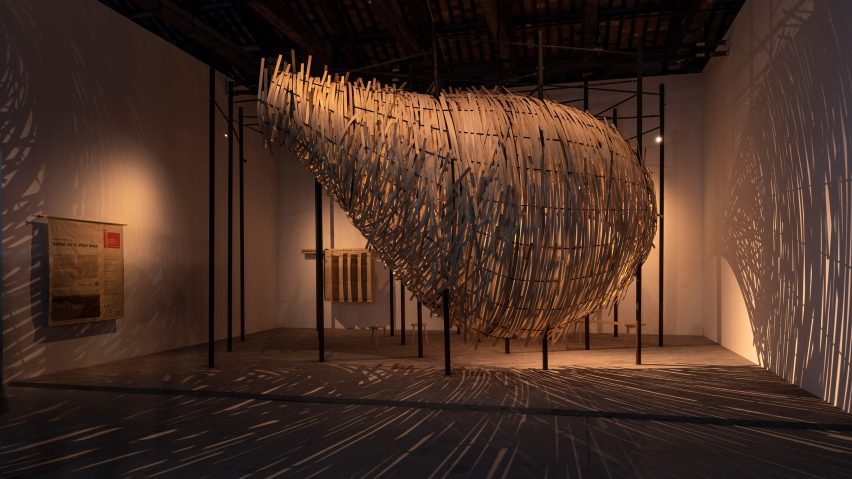The "dynamic cohabitation of the wild, domesticated and human" is at the centre of the Croatian Pavilion at the Venice Architecture Biennale, which focuses on the Lonja wetlands and is unveiled exclusively on Dezeen.
Curators Mia Roth and Tonči Čerina and editorial team Luka Fatović, Vedran Kasap, Ozana Ursić, Niko Mihaljević and Ivica Mitrović created the pavilion, called Same as it Ever Was, to have a "twofold presence".
It comprises a physical installation in the Arsenale as well as a series of workshops, talks and texts that will be produced and held at various locations in Croatia, Slovenia and Italy during the Biennale.
The project looks at Lonja wetlands in Croatia, which are located around the rivers Sava and Lonja and are among the largest in Europe.
"With their biodiversity and traditions, they present an environment of fragile equilibrium that undergoes radical changes over the course of a year," the curators told Dezeen.
"Responding to [Venice Architecture Biennale curator] Lesley Lokko's framing of the topic, we invite and display excerpts of a continuous interdisciplinary process realized through future-oriented, situated education."
The curators believe that the study of autonomous communities in regions such as the Lonja wetlands can show different approaches to dealing with the effects of climate change.
"These wetlands are taken as a departure point for speculating on preferable future paths, alternatives, and models of cohabitation," the curators said. "The realities of constant and ongoing crises and disasters urge us to build new types of resilience."
"Overlooked autonomous communities in peripheral regions give direct insight into those who are used to living with nature, and not against it, with better chances at surviving in such futures."
At the centre of the pavilion, a large sculptural piece made from woven ash wood – a material that is native to the wetlands – hovers in a rectangular grid.
A sound piece that references the fauna of the Lonja wetlands, with a percussive digital composition that represents an imaginary musical dialogue between three storks, emanates from the sculpture.
The aim was to create an installation that would rely on visitors recognising elements from humans' collective memory.
"It is not a literal memory or mimicry, but exists on the border of the known and the subconsciously recognisable, triggering desire to approach," the curators said of the installation.
"It acts as a device to briefly change perspective, an embodiment of a theme better understood by an experience in space than a statistic."
The curators hope that the pavilion will highlight interconnectedness.
"The wetlands point to the capacity of nature's self-healing without our intervention or survival, for that matter," they said.
"In its physical segment, it opens the discussion on how spaces communicate and embody connections to our origins, and the pavilion's network of workshops and talks asks for continuous education and speculation on causal systems."
Same as it Ever Was also aims to leave visitors with an understanding of the need to preserve "nature-culture symbioses". Once the biennale is over, the structure will travel back to Croatia.
"Future begins with a deep understanding of the equilibria of systems we are a part of, and their fragility," they concluded.
"Acting toward preserving nature-culture symbioses requires an understanding of what a harmonious environment is, and this particular one serves witness to an interdependence still present, yet under threat."
The Croatian pavilion is one of several that will be opened exclusively on this week. Other pavilions that were seen first on Dezeen include Brazil's, which was filled with earth, the British pavilion that aimed to encapsulate diversity and the Finnish pavilion, which "declared the death of the flushing toilet".
The photography is by Bosnic+Dorotic.
Dezeen is live reporting from the Venice Architecture Biennale, which takes place from 20 May to 26 November 2023. See Dezeen Events Guide for all the latest information you need to know to attend the event, as well as a list of other architecture and design events taking place around the world.

